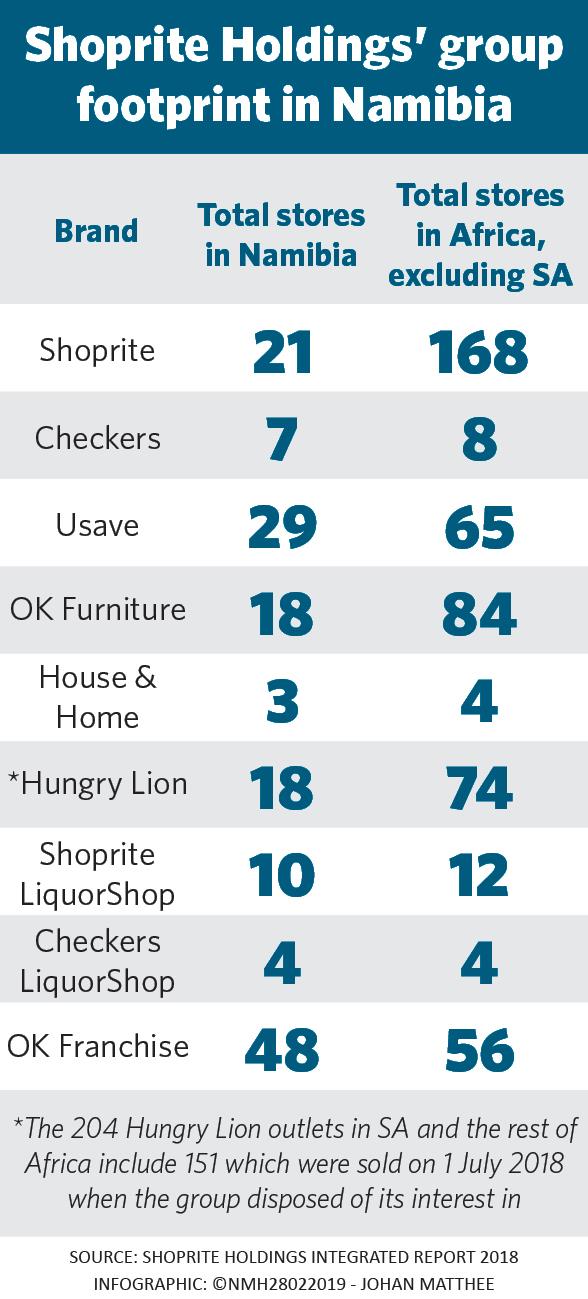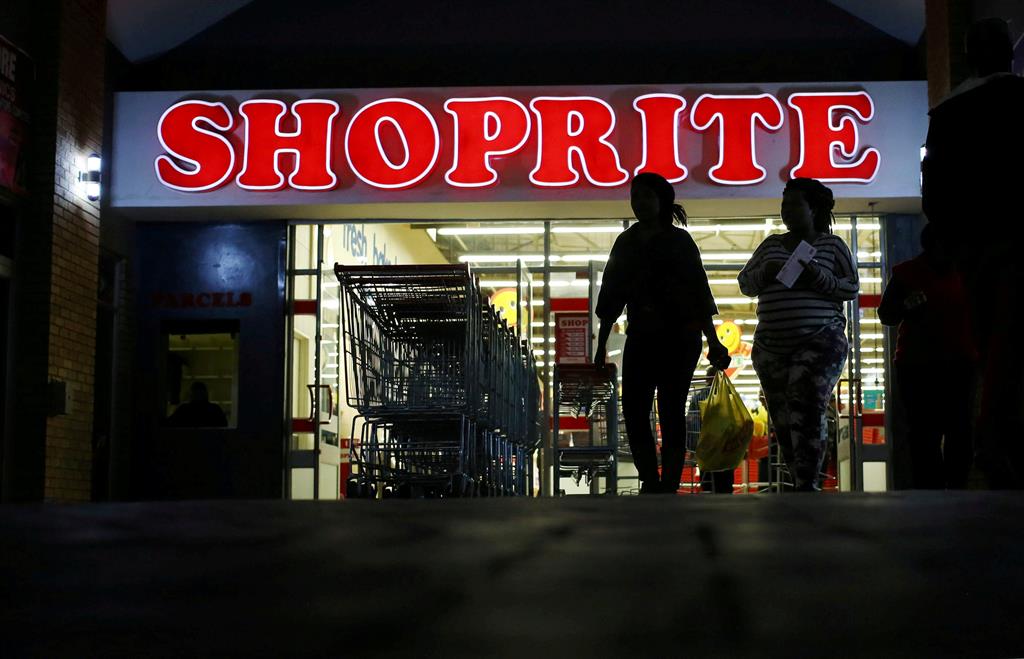Shoprite fortune hit by currency devaluation
Currency devaluations in markets such as Angola and Nigeria have made it difficult for Shoprite to operate profitably in its past half-year.
Africa's largest supermarket group Shoprite reported its first half-year earnings decline in over a decade, hit by a currency devaluation in Angola, highlighting the challenges of doing business in frontier African markets.
Releasing its latest results on Tuesday, Shoprite Holdings said sales in Namibia for the 26 weeks to 30 December 2018 were up 1.1% on an annual basis. Figures for Angola dropped by 45%, while sales in Nigeria were down 1.4%. Zambia recorded growth of 0.7%.
Measured in constant currency Angola dropped by 9.9%, while Zambia and Nigeria recorded growth of 11% and 8.4% respectively. Namibia's growth figure remained at 1.1%
Devaluation
The supermarket and furniture retailer has expanded aggressively in Africa, surpassing rivals such as Pick n Pay and Massmart to become the continent's leading retailer with more than 2 800 stores in 15 countries.
But currency devaluations in markets such as Angola, its biggest operation outside South Africa, and Nigeria have made it difficult to operate profitably elsewhere on the continent touted as the next bright growth spot for retailers. A number of African countries are short of US dollars, especially Angola and Nigeria, where weak oil prices have devalued their currencies, and Zimbabwe. Angola has devalued its currency by about 85% since the beginning of 2018. Shoprite said diluted headline earnings per share, the main profit measure, for the 26 weeks to 30 December 2018, came in at 398.5 cents, down from 525.6 cents a year earlier and falling short of a forecast of 419 cents in a poll of analysts by Refinitiv.
That was after the retailer suffered a R61.8 million loss from its outlets elsewhere in Africa mainly due to the weak trading in Angola. It reported a R552.7 million profit for the same period a year earlier.
Peers
Shoprite hasn't been the only South African company facing challenges in frontier markets, with packaging firm Nampak blaming limited liquidity in Angola for a weak second half performance and telecoms group MTN facing constant regulatory problems. However, Shoprite chairman and largest shareholder Christo Wiese assured investors that the retailer is still committed to Africa and will continue to invest in the “downturns as well as the upstream”.
“We're not in any form or fashion about to run away,” he said at the firm's half-year result presentation. Shoprite chief executive Pieter Engelbrecht said the outlook for Angola had improved.
“Our view on Angola, I'm very optimistic about it,” he told the results presentation. “The structural changes currently in the economy and by the president is all healthy and is indicative of the long term view on the country.”
Sanlam Private Wealth's senior portfolio manager, Greg Katzenellenbogen, however, said he did not share that optimism.
“In terms of Angola, it's difficult to see the currency recovering in the short term so that will have an ongoing effect on all companies that operate there,” Katzenellenbogen told Reuters. “It would be very difficult for a company to say look we made a mistake and we're getting out [of] there, but I don't quite share the same optimism because it will take a long time for them to recover.”
SA market struggling
At home things were just as bad, as Shoprite was hit by deflation in basic food categories and supply constraints stemming from strikes at its largest distribution centre and the roll out of a new group-wide IT system that hit product availability.
South African consumers have also been held back by elevated household debt, higher fuel prices and an increase in value-added tax to 15%, from 14%, and the country's retail sales slumped in December to their lowest in over a year.
Shoprite's core local supermarket operation increased sales by 2.6% with a decline in trading profit of 15.1%. In a separate statement, the group also said it aimed to simplify its share structure and was in talks with Thibault Square Financial Services Proprietary Limited to buy, redeem or cancel deferred shares held by Thibault, which owns 32.3% of voting rights.
Shoprite's capital structure currently consists of two share classes - Shoprite Holdings ordinary shares and Shoprite Holdings deferred shares - which carry about 32.3% of the voting rights of Shoprite, it said.
Furthermore, the deal will ensure that all remaining shares in the company have equal economic and voting rights, it added.
Thibault is an investment vehicle of Christo Wiese, who is Shoprite's majority shareholder.
– Own report and Nampa/Reuters
Releasing its latest results on Tuesday, Shoprite Holdings said sales in Namibia for the 26 weeks to 30 December 2018 were up 1.1% on an annual basis. Figures for Angola dropped by 45%, while sales in Nigeria were down 1.4%. Zambia recorded growth of 0.7%.
Measured in constant currency Angola dropped by 9.9%, while Zambia and Nigeria recorded growth of 11% and 8.4% respectively. Namibia's growth figure remained at 1.1%
Devaluation
The supermarket and furniture retailer has expanded aggressively in Africa, surpassing rivals such as Pick n Pay and Massmart to become the continent's leading retailer with more than 2 800 stores in 15 countries.
But currency devaluations in markets such as Angola, its biggest operation outside South Africa, and Nigeria have made it difficult to operate profitably elsewhere on the continent touted as the next bright growth spot for retailers. A number of African countries are short of US dollars, especially Angola and Nigeria, where weak oil prices have devalued their currencies, and Zimbabwe. Angola has devalued its currency by about 85% since the beginning of 2018. Shoprite said diluted headline earnings per share, the main profit measure, for the 26 weeks to 30 December 2018, came in at 398.5 cents, down from 525.6 cents a year earlier and falling short of a forecast of 419 cents in a poll of analysts by Refinitiv.
That was after the retailer suffered a R61.8 million loss from its outlets elsewhere in Africa mainly due to the weak trading in Angola. It reported a R552.7 million profit for the same period a year earlier.
Peers
Shoprite hasn't been the only South African company facing challenges in frontier markets, with packaging firm Nampak blaming limited liquidity in Angola for a weak second half performance and telecoms group MTN facing constant regulatory problems. However, Shoprite chairman and largest shareholder Christo Wiese assured investors that the retailer is still committed to Africa and will continue to invest in the “downturns as well as the upstream”.
“We're not in any form or fashion about to run away,” he said at the firm's half-year result presentation. Shoprite chief executive Pieter Engelbrecht said the outlook for Angola had improved.
“Our view on Angola, I'm very optimistic about it,” he told the results presentation. “The structural changes currently in the economy and by the president is all healthy and is indicative of the long term view on the country.”
Sanlam Private Wealth's senior portfolio manager, Greg Katzenellenbogen, however, said he did not share that optimism.
“In terms of Angola, it's difficult to see the currency recovering in the short term so that will have an ongoing effect on all companies that operate there,” Katzenellenbogen told Reuters. “It would be very difficult for a company to say look we made a mistake and we're getting out [of] there, but I don't quite share the same optimism because it will take a long time for them to recover.”
SA market struggling
At home things were just as bad, as Shoprite was hit by deflation in basic food categories and supply constraints stemming from strikes at its largest distribution centre and the roll out of a new group-wide IT system that hit product availability.
South African consumers have also been held back by elevated household debt, higher fuel prices and an increase in value-added tax to 15%, from 14%, and the country's retail sales slumped in December to their lowest in over a year.
Shoprite's core local supermarket operation increased sales by 2.6% with a decline in trading profit of 15.1%. In a separate statement, the group also said it aimed to simplify its share structure and was in talks with Thibault Square Financial Services Proprietary Limited to buy, redeem or cancel deferred shares held by Thibault, which owns 32.3% of voting rights.
Shoprite's capital structure currently consists of two share classes - Shoprite Holdings ordinary shares and Shoprite Holdings deferred shares - which carry about 32.3% of the voting rights of Shoprite, it said.
Furthermore, the deal will ensure that all remaining shares in the company have equal economic and voting rights, it added.
Thibault is an investment vehicle of Christo Wiese, who is Shoprite's majority shareholder.
– Own report and Nampa/Reuters







Kommentaar
Republikein
Geen kommentaar is op hierdie artikel gelaat nie